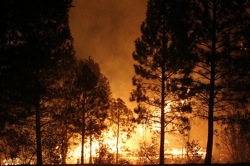
Last year around this time, I asked some state fire officials what to expect in terms of the fire season and got a definite “It depends.” On the one hand, scant precipitation over the winter had left behind a dry landscape. On the other hand, spring rains had given a boost to rebounding vegetation, providing more fuel for later in the season. I was reminded of the old joke about politicians searching for a “one-handed economist” and found myself wishing for a one-handed forester.
Whether a good spring dousing is more likely to inhibit wildfires or feed them is a common source of confusion, which San Jose Mercury News writer Paul Rogers has sought to extinguish. By dipping into four decades of fire data, Rogers and his researchers at the Merc conclude that dry winters generally make for more intense fire seasons in California.
Rogers writes that “the worst fire seasons come after dry winters, not wetter ones like the one we’ve just had.” That would seem to bear out a conversation I had in 2007 with Crawford Tuttle, Chief Deputy Director at CalFire, fire protection arm of the state’s department of forestry. Walking through the burn zone of a Sierra wildfire that broke out in May of that year, Tuttle said that early-season fire was “a great demonstration of how (the) fire regime–fire severity is expanding in California.” Tuttle told me that when moisture levels in the air, vegetation and soil are lower, earlier in the season, it’s likely that the fire season will be intense.
The preceding winter had been dry by historical standards, with just over half the normal amount of precipitation and indeed, wildfires went on to char almost a million acres in the state that year.
